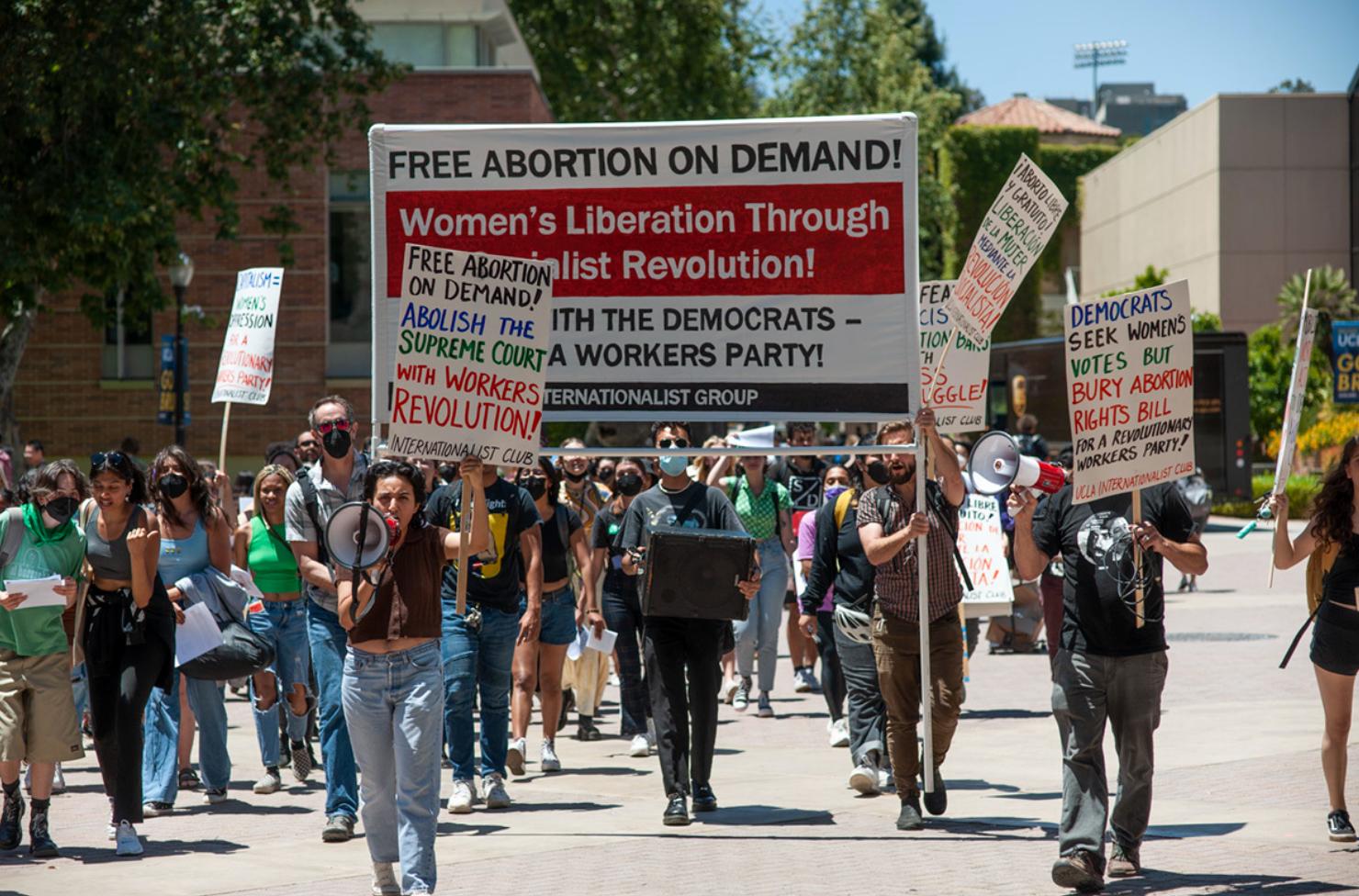US Supreme Court future decisions could redefine national abortion care
Pro-choice protesters march through Bruin Plaza after the Supreme Court overturned Roe v. Wade in June 2022. The court will decide upon two more cases relating to abortion rights this term. (Daily Bruin file photo)
By Vivian Stein
June 10, 2024 12:13 a.m.
This post was updated June 10 at 2:30 p.m.
In the wake of the reversal of Roe v. Wade, two United States Supreme Court cases could redefine the national landscape of abortion care.
In its 2022 decision in Dobbs v. Jackson Women’s Health Organization, the Supreme Court overturned Roe v. Wade and Planned Parenthood of Southeastern Pennsylvania v. Casey — the landmark decisions that guaranteed a constitutional right to abortion before fetal viability.
The court also heard oral arguments in March and April, respectively, for U.S. Food and Drug Administration v. Alliance for Hippocratic Medicine — a case concerning the right to medication abortions — and Moyle v. U.S., which concerns the right to abortions in emergency medical situations. The court is expected to decide on both cases by the end of June.
FDA v. Alliance for Hippocratic Medicine will decide if mifepristone, the abortion pill used for over half of abortions in the U.S., will still remain as accessible across the country as it is currently, said Amanda Barrow, a senior staff attorney at the UCLA School of Law’s Center on Reproductive Health, Law and Policy.
“The decision could reimpose medically unnecessary restrictions on mifepristone, which would disrupt abortion provision and further limit patients’ options,” she said.
The U.S. Court of Appeals for the Fifth Circuit ruled in August to reinstate strict pre-2016 mifepristone restrictions, which include that it is unlawful for the medication to be used later than seven weeks after an individual becomes pregnant, mailed to patients or prescribed by anyone other than a doctor.
A ruling in support of the Fifth Circuit’s ruling would prevent abortion providers from using telehealth services to prescribe the pill, Barrow added.
Telehealth appointments can make abortion accessible for those in rural areas who lack access to a health care provider nearby, said Cathren Cohen, a staff attorney at the same center as Barrow. It also allows individuals coming to California to seek care more easily, as they may have trouble scheduling in-person appointments because of the vast influx of patients, she added.
Under current rules, mifepristone can be used until about 10 weeks after a patient’s last menstrual period, Cohen said. If the Fifth Circuit’s decision is affirmed, the pill would only be permitted within a gestational period of about seven weeks — a strict deadline that those without financial support and transportation to clinics may struggle to meet, she added.
Moyle v. United States, meanwhile, concerns a conflict between federal and state law, Cohen said. Idaho currently has strict abortion bans that only provide an exception if the life — not the overall health — of the pregnant individual is endangered, she added.
“The only emergency situation where somebody would be able to get an abortion is if they were going to die,” Cohen said.
This Idaho law conflicts with the federal Emergency Medical Treatment and Active Labor Act, which holds that doctors must provide treatment if a patient is in an emergency situation, even if the patient cannot pay for it, Cohen said. This extends to any individual who needs an emergency abortion as a part of stabilizing medical treatment, she said.
Cohen said the ruling in Moyle v. U.S. will determine whether required stabilizing treatment under EMTALA will also apply to emergency abortions in states with strict abortion bans.
“We’re already seeing the implications of these really strict bans and these situations where people do need emergency abortions,” Cohen said. “They aren’t able to get them because doctors are so afraid of the state laws.”
Cases like these can have many ramifications in tightly regulated states — including the closing of abortion clinics or a stalling of abortion services — as doctors lack clarity on what is or is not legal, said Sarah Raifman, a director at UC San Francisco’s Advancing New Standards in Reproductive Health project.
If the court upholds Idaho’s law, states with fewer abortion restrictions such as California could see an increase in people seeking abortion care, Cohen said.
UCLA students from states with restrictive abortion laws already face challenges accessing reproductive health resources, said Lucy Rich, a second-year communications student. She added restrictions brought on by these cases will adversely affect these students further.
Rich, who is also the external vice president of Ignite at UCLA, a reproductive justice club, said voting in upcoming elections is a way to influence decisions regarding abortion.
Rich also said much of reproductive advocacy involves holding members of U.S. government accountable for what they say and making sure they actively stand for reproductive rights. She added that harnessing student voices on university campuses is a way to create change on the abortion care issues these cases address.
“As students, we have a lot of power, especially at a public university,” she said. “We can come together and use our voice to pressure people in power to make decisions that will get done what we need to get done.”
These two cases point to larger attempts to restrict abortion, Cohen said. She added that the anti-abortion movement will not end with overturning Roe v. Wade, since some states still provide accessible abortion care, and people can cross state lines for procedures or have pills mailed to them.
“Overturning Roe was not the end of this movement but really the beginning of a broader movement to totally restrict abortion,” she said.
